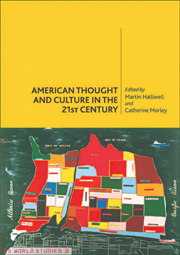Book contents
- Frontmatter
- Contents
- Acknowledgements
- Notes on the Contributors
- Introduction: The Next American Century?
- PART 1 POLITICS
- PART 2 SOCIETY
- 7 Contemporary Social Criticism
- 8 Religion in Post-Secular America
- 9 The US and Globalisation
- 10 The Future of Medicine
- 11 Technology in the 21st Century
- 12 America and the Environment
- PART 3 CULTURE
- Bibliography
- Index
12 - America and the Environment
from PART 2 - SOCIETY
Published online by Cambridge University Press: 05 August 2013
- Frontmatter
- Contents
- Acknowledgements
- Notes on the Contributors
- Introduction: The Next American Century?
- PART 1 POLITICS
- PART 2 SOCIETY
- 7 Contemporary Social Criticism
- 8 Religion in Post-Secular America
- 9 The US and Globalisation
- 10 The Future of Medicine
- 11 Technology in the 21st Century
- 12 America and the Environment
- PART 3 CULTURE
- Bibliography
- Index
Summary
‘Thank God men cannot fly, and lay waste the sky as well as the earth’, Henry David Thoreau pondered at his Walden retreat near Concord, Massachusetts in the late 1840s. The rise of industrialisation, commerce and materialism offended the sensibilities of a man dedicated to intellectual contemplation and transcendental nature. Thoreau struggled with the enterprise of nation-building going on about him. On some days, the sounds of the Fitchburg Railroad penetrated his forest surroundings, an ‘iron horse’ that made ‘the hills echo with his snort like thunder, shaking the earth with his feet, and breathing fire and smoke from his nostrils.’ On other days, Thoreau managed to sit in his ‘sunny doorway from sunrise till noon, rapt in a revery, amid the pines and hickories and sumachs, in undisturbed solitude and stillness, while the birds sang around or flitted noiseless through the house.’ One hundred and fifty years on air flight is a common practice, with the waste products of the aviation industry a growing contributor to global warming, and industrialisation, commerce and materialism continue to shape American priorities at the beginning of the 21st century. At the same time, the United States is regarded by many as the birthplace of the national park idea, and respected for its history of environmental activism and legislation. Thoreau's beloved rural idyll of Walden Pond has been designated a National Historical and Literary Landmark and entertains thousands of visitors each year.
- Type
- Chapter
- Information
- American Thought and Culture in the 21st Century , pp. 195 - 208Publisher: Edinburgh University PressPrint publication year: 2008



